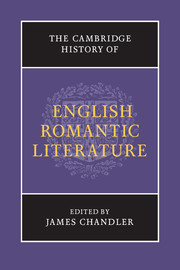Book contents
- Frontmatter
- Introduction
- Part I The Ends of Enlightenment
- Part II Geographies: The Scenes of Literary Life
- 5 London in the 1790s
- 6 Edinburgh and Lowland Scotland
- 7 Romantic Ireland: 1750–1845
- 8 France, Germany, America
- 9 The ‘warm south’
- 10 Country matters
- 11 Romanticism and the wider world: poetry, travel literature and empire
- 12 The homes of England
- 13 Writing, reading and the scenes of war
- 14 Regency London
- Part III Histories: Writing in the New Movements
- Part IV The Ends of Romanticism
- Chronology
- Bibliographies
- Index
- 1 A New Pocket Map of the Cities of London and Westminster; with the Borough of Southwark, Comprehending the new Buildings and other Alterations, 3rd edn (London: William Faden, 1790).">
- References
9 - The ‘warm south’
from Part II - Geographies: The Scenes of Literary Life
Published online by Cambridge University Press: 28 May 2009
- Frontmatter
- Introduction
- Part I The Ends of Enlightenment
- Part II Geographies: The Scenes of Literary Life
- 5 London in the 1790s
- 6 Edinburgh and Lowland Scotland
- 7 Romantic Ireland: 1750–1845
- 8 France, Germany, America
- 9 The ‘warm south’
- 10 Country matters
- 11 Romanticism and the wider world: poetry, travel literature and empire
- 12 The homes of England
- 13 Writing, reading and the scenes of war
- 14 Regency London
- Part III Histories: Writing in the New Movements
- Part IV The Ends of Romanticism
- Chronology
- Bibliographies
- Index
- 1 A New Pocket Map of the Cities of London and Westminster; with the Borough of Southwark, Comprehending the new Buildings and other Alterations, 3rd edn (London: William Faden, 1790).">
- References
Summary
O, for a draught of vintage! That hath been
Cool’d a long age in the deep-delved earth,
Tasting of Flora and the country green,
Dance, and Provençal song, and sunburnt mirth!
O for a beaker full of the warm South! …
John Keats, ‘Ode to a Nightingale’ (1819)The ‘cult of the south’
For Britons of the Romantic era, the ‘warm south’ was many things: an imaginary elsewhere of lemon trees and olive groves; a place of refuge and exile; a sensuous landscape of desire; a living gallery of the picturesque; a ruined monument to lost liberties; a nidus of revolutionary fervour; and a region halted on the far side of enlightenment, fatally in thrall to superstition. It is hard to imagine British Romanticism uninvested by the sun and shadows of this ‘world elsewhere’, not least because this interfusion of British and Mediterranean cultures had been centuries in the making. In the sixteenth century, when Sir Philip Sidney and Lord Henry Wotton ventured to Italy, it became fashionable for young men (often aides to aristocrats or official attachés) to undertake what came to be called the ‘Grand Tour’. Two centuries later, the rise of Napoleon halted the routines of the Grand Tour, though some brave travellers would invent their own grand alternatives: for Wollstonecraft in 1796, Scandinavia; for Byron in 1809, Greece, Albania and Turkey. After Napoleon’s incarceration on Elba in 1814, Mediterranean travel resumed with a vengeance. The era of the Grand Tour did not end so much as persist, in a somewhat democratized form, until well into the nineteenth century.
Keywords
- Type
- Chapter
- Information
- The Cambridge History of English Romantic Literature , pp. 224 - 245Publisher: Cambridge University PressPrint publication year: 2009
References
- 2
- Cited by

